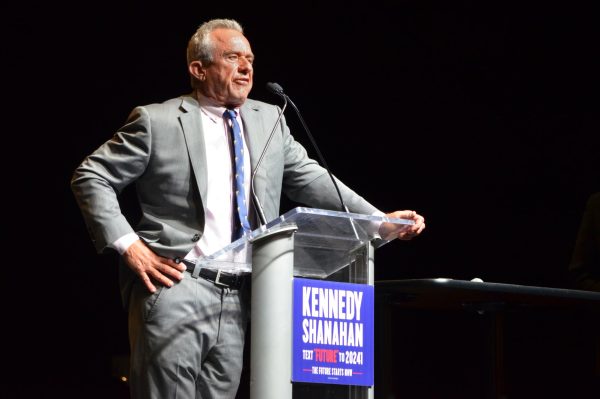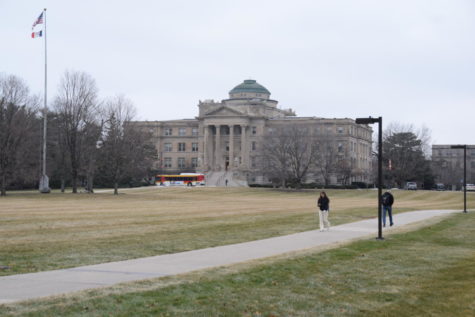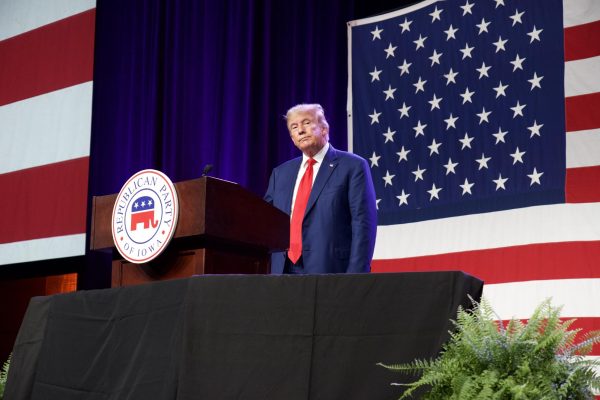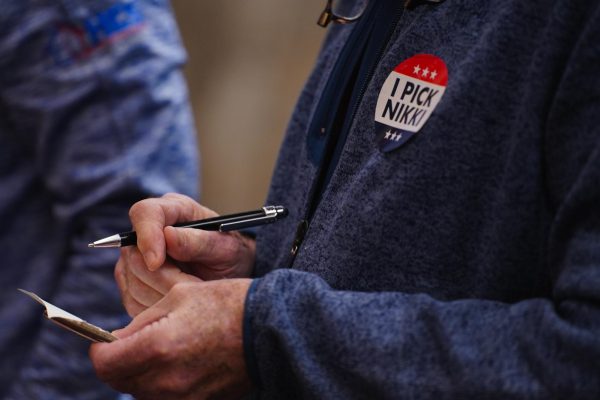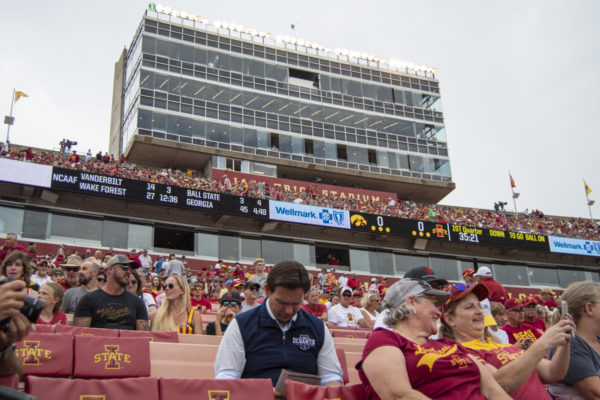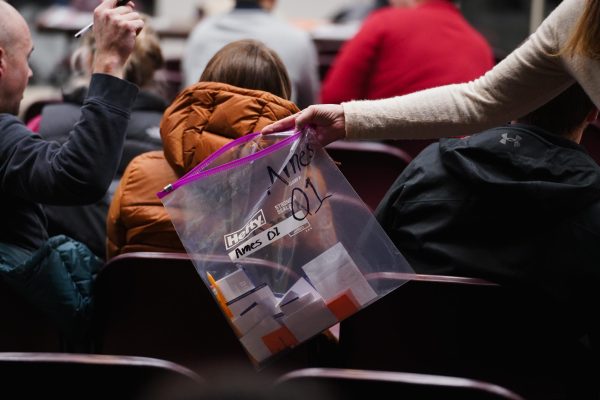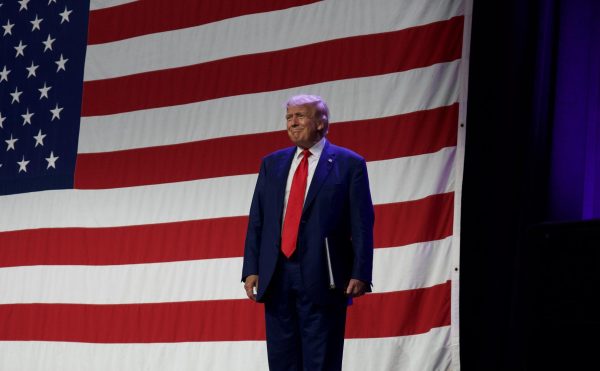Decision time in New Hampshire GOP race
January 10, 2012
MANCHESTER, New Hampshire (CNN) – Decision time in the second round of the Republican presidential contest arrived Tuesday in New Hampshire, where overnight returns in two villages gave former Massachusetts Gov. Mitt Romney a win and a tie.
A record 250,000 voters are expected to turn out for the GOP primary, Deputy Secretary of State David Scanlan told CNN. With no competitive challenger to President Barack Obama on the Democratic side, more “undeclared” voters could weigh in on the Republican race, he said.
“We’re hearing that the turnout is steady,” Scanlan said. “There aren’t lines that are backing up, but people are just constantly moving through the polling places. It’s certainly what we would expect during a presidential primary.”
The first votes were cast just after midnight in the tiny communities of Dixville Notch and Hart’s Location. In Dixville Notch, Romney tied Jon Huntsman, the former Utah governor and ambassador to China, with two votes each, while Romney edged Texas Rep. Ron Paul 5-4 in Hart’s location.
Paul and former House Speaker Newt Gingrich won one vote each in Dixville Notch. Huntsman placed third with two votes in Hart’s Location, while Gingrich and Texas Gov. Rick Perry won one vote each.
President Barack Obama received all the votes in the Democratic primary in both locations.
The last round of published polls showed Romney with a strong lead in what is basically his home field. With the rest of the state trooping to the polls in unseasonably warm weather Tuesday afternoon, attention shifted toward who would finish second or third going into the next contest, in South Carolina.
Huntsman, who skipped last week’s Iowa caucuses to campaign heavily in New Hampshire, told CNN his showing in Dixville Notch was “a harbinger of things to come.”
“Tonight, we have to make the market move in New Hampshire,” said Huntsman, whom late polls show running neck-and-neck with Paul for second place. “We have to exceed expectations, and if you can exceed expectations in New Hampshire, which is a broad-based primary turnout, then you’ll light up South Carolina and the states beyond.”
Meanwhile, Gingrich argued that a Romney showing in the 30% range, as the most recent polling suggests, could hurt the front-runner even if he wins Tuesday’s contest.
“If he can’t come close to 50% here, it’s very unlikely he can sweep the nomination,” Gingrich told reporters in Bedford. “And I think that gives the party time to take a deep breath, look at his record and begin to realize that maybe this isn’t the right guy to run against Obama.”
Gingrich has been pounding at Romney since Iowa, complaining about a massive negative ad campaign against him by allies of the former Massachusetts governor. A Gingrich-allied super PAC has already launched its own anti-Romney barrage in South Carolina. And Gingrich and others have honed in on Romney’s years as a financier with Bain Capital, accusing him of getting rich by gutting companies and laying off workers.
Though Romney has said his work at the Boston-based private equity firm ultimately led to the creation of 100,000 jobs, Gingrich said Romney’s pursuit of wealth exacted a huge cost.
“Is capitalism really about the ability of a handful of rich people to manipulate the lives of thousands of other people and walk off with the money?” Gingrich said Monday. “Or is that, in fact, a little bit of a flawed system? And so I do draw a distinction between looting a company, leaving behind broken families and broken neighbors, and leaving behind a factory that should be there.”
Romney fired back that Gingrich and others were joining Obama in attacking the free enterprise system.
“As we’ll find out, free enterprise will be on trial,” Romney said. “I thought it was going to come from the president, from the Democrats, from the left, but instead it’s coming from Speaker Gingrich and apparently others.”
Gingrich wasn’t alone in attacking Romney’s business record, however. In South Carolina, Perry — who largely ceded the field in New Hampshire — told supporters Romney’s firm “looted” a photo company in Gaffney and a steel company in Georgetown.
The Texas governor seized on a remark Romney made to voters in New Hampshire that he knows what it’s like to worry about getting a pink slip.
“I have no doubt that Mitt Romney was worried about pink slips — whether he was going to have enough of them to hand out,” Perry said. “With all the jobs that they killed, I’m sure he was worried that he’d run out of pink slips.”
Despite his lead in the polls, Romney remained modest, telling reporters Monday in Hudson, New Hampshire, that, “right now what I’m worried about is winning in New Hampshire and hopefully having a margin larger than Iowa. I don’t think I can handle another night like that.”
Romney got eight more votes than former Pennsylvania Sen. Rick Santorum in last week’s Iowa caucuses. Paul, who finished a strong third in Iowa, touted his plan to downsize government on Monday, repeating his pledge to cut $1 trillion from the federal budget in his first year.
The onetime Libertarian standard-bearer said most of the debate about spending cuts is “fiction,” taking only bites out of a still-growing government.
“It’s all fiction, because they don’t give up on the assumption that government has to be involved in everything,” he said.
And while Santorum saw his New Hampshire poll numbers surge from single digits to the low double digits after his near-win in Iowa, he was downplaying expectations for Tuesday night.
“We haven’t spent a penny on broadcast television here in New Hampshire. We’ve only spent five days campaigning here in the last month. We just came here starting at two or three points pretty much tied with Rick Perry in New Hampshire. We’ve been working hard and now into the double digits. Hopefully we can finish well,” Santorum said.
Romney tops most national polling and is ahead in the latest surveys in South Carolina and Florida, the next two states to hold contests following New Hampshire. But he took new fire Monday after a speech to the Nashua Chamber of Commerce, when he said he wanted Americans who were unhappy with their health care coverage to be able to switch insurance companies.
“I like being able to fire people who provide services to me,” he said. “You know, if someone doesn’t give me the good service I need, I want to say, ‘You know, I’m going to go get someone else to provide that service to me.’ “
The first seven words of that sentence — “I like being able to fire people,” dangled like low-hanging fruit, and some of Romney’s rivals pounced.
“Governor Romney enjoys firing people. I enjoy creating jobs,” Huntsman said at a campaign stop in Concord on Monday.
Romney Communications Director Gail Gitcho said opponents are taking Romney’s remarks out of context — a point on which Gingrich defended him Tuesday. But the attacks have fed the image of Romney that his GOP opponents and Democrats have pushed: That he’s a wealthy businessman who can’t connect to average Americans.






